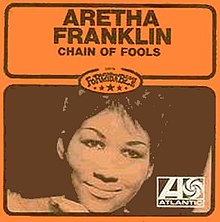Chain Of Fools (song)
| "Chain of Fools" | ||||
|---|---|---|---|---|
 |
||||
| Single by Aretha Franklin | ||||
| from the album Lady Soul | ||||
| B-side | "Prove It" | |||
| Released | November 1967 | |||
| Format | 7" single | |||
| Genre | R&B• Soul • Rock | |||
| Length |
4:03 (Original unreleased recording) 2:47 (Released version) |
|||
| Label | Atlantic | |||
| Writer(s) | Don Covay | |||
| Producer(s) | Jerry Wexler | |||
| Aretha Franklin singles chronology | ||||
|
||||
"Chain of Fools" is a song written by Don Covay. Aretha Franklin first released the song as a single in 1967 and subsequently it appeared on many of her albums.
Asked by Jerry Wexler, producer with Atlantic Records, to create songs for Otis Redding, Covay recorded a demo of "Chain of Fools", a song he had written in his youth while singing Gospel with his brothers and sisters. The recording featured Covay singing and playing guitar, overdubbed with himself singing background. Listening to the demo, Wexler chose to place the song with Aretha Franklin rather than Redding.
It reached number one on the U.S. R&B chart, staying there for four weeks, and went to number two on the pop chart in January 1968. It won the Grammy Award for Best Female R&B Vocal Performance, and later a Grammy Hall of Fame Award. In 2004, this song was ranked #249 on Rolling Stone's list of The 500 Greatest Songs of All Time. The trademark tremolo guitar licks at the introduction were played by Joe South. The song was edited for LP & 45; the original long version appeared on the quadrophonic LP The Best of Aretha Franklin in 1973 (later released on a quadrophonic DVD by Rhino in 2010), and on the 1995 Rhino remastering of Lady Soul. Live recordings have appeared on the albums Aretha in Paris (1968) and VH1 Divas Live (1998, with Mariah Carey).
It is musically noteworthy in that it's composed completely in a minor mode (Aeolian), and is one of the few hit songs based on just one (minor) chord.
It is claimed by some that "Chain of Fools" is an unauthorized rewrite of the gospel song "Pains of Life", recorded by Reverend Elijah Fair & The Sensational Gladys Davis Trio (an obscure gospel group from Houston, Texas), but without evidence showing that the gospel song was recorded first, this can only be conjecture.
...
Wikipedia
